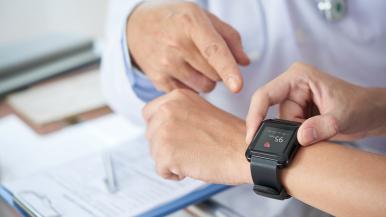A smartwatch can be a helpful tool in managing your health, from counting steps to monitoring sleep. It can also save your life.
Several popular smartwatches now detect atrial fibrillation, or AFib, the most common type of irregular heartbeat and a leading cause of strokes.
Although AFib can cause palpitations, shortness of breath or fatigue, the symptoms aren't always obvious. Enter smartwatches, which can catch AFib before you even know it.
How accurately do smartwatches detect AFib? “Very accurately,” says Erica D. Engelstein, MD, an electrophysiologist at Rush Oak Park Hospital. The FDA has even approved use of the Apple Watch and the Samsung Galaxy for AFib detection, she notes. And they’re right about 90% of the time.
“Smartwatches have an algorithm built in that indicates whether it's a normal heart rhythm or AFib,” Engelstein says. “It’s not perfect, but it’s pretty good.”
What if your watch detects AFib?
But not all irregular heart rhythms mean you have AFib, so sometimes a smartwatch can be wrong. It might detect what it thinks is AFib when it’s only just an extra heartbeat that's out of sync.
So if your watch detects AFib, the first step is to confirm it with your primary care doctor. They can then refer you to a cardiologist or electrophysiologist — who specializes in heart rhythm disorders — for further evaluation.
And there’s no time to waste: If left unchecked, AFib can lead to a potentially debilitating, or even fatal, stroke or other serious medical problem.
Smartwatches can also help people who already have AFib. As the technology and research continue to advance, Engelstein says patients might be able to better manage not only their symptoms but also blood thinners. They help prevent strokes in high-risk patients with atrial fibrillation but can also increase the risk of bleeding.
Future promise
Smartwatches increasingly may be central to screening and early detection of AFib, meaning patients could seek treatment before serious complications occur. Providing reliable documentation of their heart rhythm to their specialist will make the doctor’s visits more effective.
Traditional heart monitors can only provide a snapshot of your heart rhythm for a limited time. Smartwatches can do something primary care doctors and specialists cannot: monitor your heart’s rhythm 24 hours a day. Because of this, the device is much better suited to customize a treatment plan than just relying on transient symptoms.
Finding AFib early is critical. Managing it once you have it is just as critical. And Engelstein is most optimistic about smartwatches’ future ability to personalize care for those with the condition. If a patient is diagnosed with AFib, for example, a specialist can then recommend use of the watch to monitor the effectiveness of treatment. The data and monitoring capabilities of smartwatches will greatly benefit future patients.




